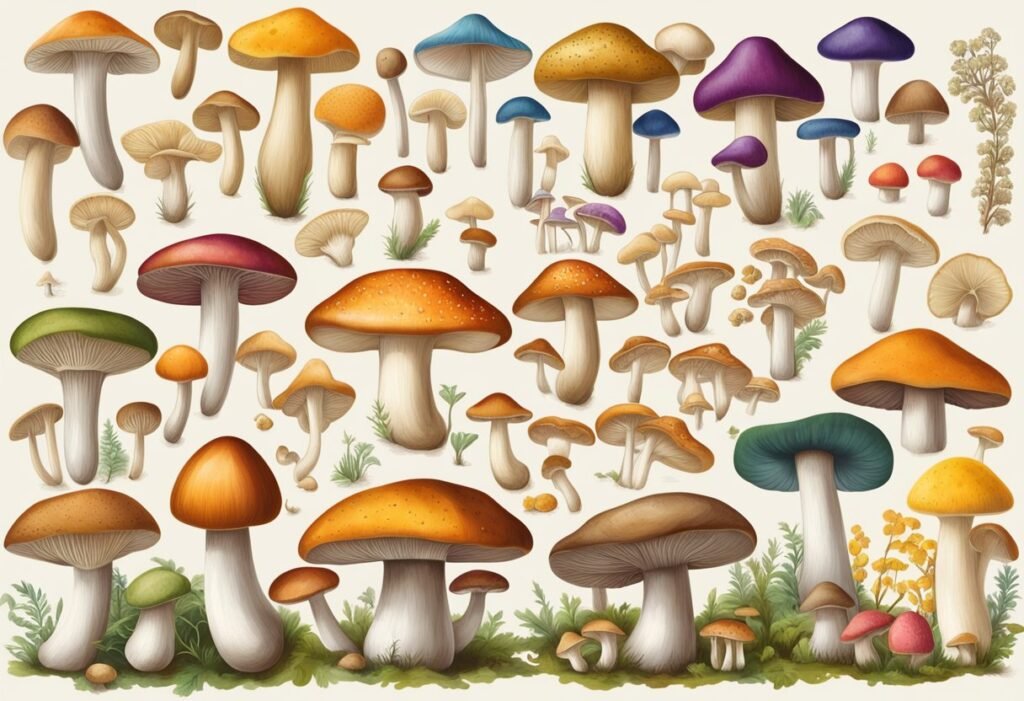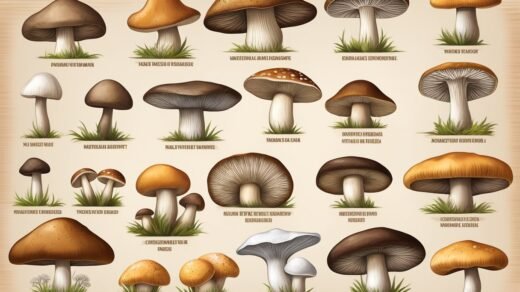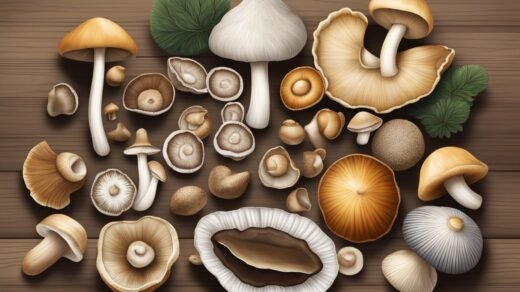Mushrooms have been used for centuries in traditional medicine due to their potential health benefits. They are rich in antioxidants, which are molecules that protect cells from damage caused by harmful molecules known as free radicals. Antioxidants can help reduce the risk of chronic diseases such as cancer, heart disease, and Alzheimer’s disease.
Studies have shown that some mushrooms have higher antioxidant levels than others. For example, shiitake, oyster, and lion’s mane mushrooms are considered some of the healthiest mushrooms due to their high antioxidant content. These mushrooms also contain other beneficial nutrients such as carbohydrates and amino acids, making them a great addition to a healthy diet.
If you’re looking to boost your antioxidant intake, including mushrooms in your diet can be a great place to start. However, it’s important to note that the antioxidant content of mushrooms can vary depending on factors such as the species, growing conditions, and preparation methods. Therefore, it’s important to consume a variety of mushrooms to ensure you’re getting a range of nutrients and antioxidants.
Overview of Antioxidants in Mushrooms

Mushrooms are a great source of antioxidants, which are compounds that help protect the body from damage caused by free radicals. Free radicals are unstable molecules that can damage cells and contribute to aging and disease.
There are many different types of antioxidants found in mushrooms, including polyphenols, polysaccharides, vitamins, carotenoids, and minerals. Each type of antioxidant has its own unique properties and benefits.
Some of the most antioxidant-rich mushrooms include:
- Porcini mushrooms: These mushrooms are high in ergothioneine, a potent antioxidant that has been shown to protect cells from oxidative stress.
- Shiitake mushrooms: Shiitake mushrooms are rich in polysaccharides, which have been shown to have anti-inflammatory and immune-boosting properties.
- White button mushrooms: These mushrooms are a good source of the antioxidant selenium, which has been shown to have anti-cancer properties.
- Reishi mushrooms: Reishi mushrooms are high in triterpenoids, which have been shown to have anti-inflammatory and anti-tumor properties.
It’s important to note that the antioxidant content of mushrooms can vary depending on how they are grown and prepared. For example, wild mushrooms may have higher levels of antioxidants than cultivated mushrooms, and cooking mushrooms can reduce their antioxidant content.
Overall, mushrooms are a great addition to a healthy diet and can provide a range of health benefits thanks to their antioxidant content.
Top Antioxidant-Rich Mushrooms

Mushrooms are a great source of antioxidants, which are essential for maintaining good health and preventing chronic diseases. Here are some of the most antioxidant-rich mushrooms:
Porcini
Porcini mushrooms are known for their nutty, meaty flavor and are a great source of antioxidants. They contain high levels of ergothioneine, which is a powerful antioxidant that helps protect cells from oxidative stress. Additionally, porcini mushrooms are rich in other antioxidants such as polyphenols, which have been shown to have anti-inflammatory and anti-cancer properties.
Shiitake
Shiitake mushrooms are widely used in Asian cuisine and are a great source of antioxidants. They contain high levels of polysaccharides, which are known to have immune-boosting properties. Shiitake mushrooms are also rich in other antioxidants such as ergothioneine and polyphenols, which help protect cells from oxidative stress.
Oyster
Oyster mushrooms are a great source of antioxidants and are known for their delicate, nutty flavor. They contain high levels of ergothioneine, which is a powerful antioxidant that helps protect cells from oxidative stress. Additionally, oyster mushrooms are rich in other antioxidants such as polyphenols, which have been shown to have anti-inflammatory and anti-cancer properties.
Maitake
Maitake mushrooms are known for their earthy, rich flavor and are a great source of antioxidants. They contain high levels of polysaccharides, which have been shown to have immune-boosting properties. Maitake mushrooms are also rich in other antioxidants such as ergothioneine and polyphenols, which help protect cells from oxidative stress.
In conclusion, these mushrooms are a great source of antioxidants and should be included in a healthy diet.
Factors Influencing Antioxidant Levels
Growing Conditions
The growing conditions of mushrooms can greatly affect their antioxidant levels. Mushrooms grown in nutrient-rich soils tend to have higher levels of antioxidants compared to those grown in poor soils. Additionally, exposure to sunlight can increase the production of vitamin D, which is also an antioxidant. Therefore, mushrooms grown in natural sunlight or exposed to UV light during growth may have higher antioxidant levels.
Mushroom Species
Different mushroom species have varying levels of antioxidants. For example, research has shown that shiitake mushrooms have higher levels of antioxidants compared to white button mushrooms. Other species that have been found to have high antioxidant levels include maitake, oyster, and porcini mushrooms.
Preparation and Cooking Methods
The preparation and cooking methods used for mushrooms can also affect their antioxidant levels. Boiling and frying mushrooms can cause a loss of antioxidants, while steaming and microwaving have been shown to preserve antioxidant levels. Additionally, consuming raw mushrooms can provide higher levels of antioxidants compared to cooked mushrooms.
It is important to note that while certain factors can influence the antioxidant levels of mushrooms, the overall antioxidant content of mushrooms is still relatively low compared to other antioxidant-rich foods. Therefore, it is important to consume a variety of fruits and vegetables to ensure adequate antioxidant intake.
Health Benefits of Mushroom Antioxidants
Mushrooms are a great source of antioxidants, which are essential for maintaining good health. Antioxidants help prevent cell damage caused by free radicals and other harmful substances, which can lead to chronic diseases such as cancer, heart disease, and Alzheimer’s disease.
Several types of mushrooms have been found to be particularly rich in antioxidants. These include:
- Shiitake mushrooms: Shiitake mushrooms are a great source of polysaccharides, which are known to have antioxidant properties. They also contain ergothioneine, a powerful antioxidant that helps protect against oxidative stress.
- Reishi mushrooms: Reishi mushrooms are rich in antioxidants such as triterpenoids and polysaccharides. These antioxidants help protect against cell damage and may have anti-inflammatory effects.
- Lion’s Mane mushrooms: Lion’s Mane mushrooms contain antioxidants such as ergothioneine and hericenones, which have been shown to have neuroprotective effects and may help improve cognitive function.
- Oyster mushrooms: Oyster mushrooms are a good source of ergothioneine and other antioxidants such as polyphenols. These antioxidants help protect against oxidative stress and may have anti-inflammatory effects.
- Maitake mushrooms: Maitake mushrooms contain antioxidants such as beta-glucans, which have been shown to have immune-boosting properties. They also contain ergothioneine, which helps protect against oxidative stress.
Consuming mushrooms regularly can help boost your antioxidant intake and may provide a range of health benefits. However, it is important to note that while mushrooms are a great source of antioxidants, they should not be relied upon as the sole source of antioxidants in your diet. A well-rounded diet that includes a variety of fruits and vegetables is essential for maintaining good health.
Comparative Analysis with Other Foods
Mushrooms are a great source of antioxidants, and many studies have shown that they contain higher levels of antioxidants than some fruits and vegetables. However, it’s important to note that not all mushrooms are created equal when it comes to antioxidant content. Here is a comparative analysis of mushrooms with other foods that are known for their antioxidant content.
Berries
Berries are known for their high antioxidant content, and they are often recommended as a healthy snack. Blueberries, raspberries, and strawberries are some of the most antioxidant-rich berries. According to one study, blueberries contain 9.2 mmol of antioxidants per 100 grams, while raspberries contain 4 mmol per 100 grams. By comparison, shiitake mushrooms contain 2.8 mmol of antioxidants per 100 grams.
Nuts
Nuts are another good source of antioxidants, and they are also a great source of healthy fats. Walnuts, almonds, and pecans are some of the most antioxidant-rich nuts. According to one study, walnuts contain 20.97 mmol of antioxidants per 100 grams, while almonds contain 4.41 mmol per 100 grams. By comparison, portobello mushrooms contain 2.6 mmol of antioxidants per 100 grams.
Spices
Spices are a great way to add flavor to your food while also boosting your antioxidant intake. Some of the most antioxidant-rich spices include cloves, cinnamon, and oregano. According to one study, cloves contain 314.4 mmol of antioxidants per 100 grams, while cinnamon contains 63.2 mmol per 100 grams. By comparison, white button mushrooms contain 0.3 mmol of antioxidants per 100 grams.
Overall, while mushrooms may not be the highest source of antioxidants, they are still a great addition to a healthy diet. Incorporating a variety of antioxidant-rich foods into your diet can help promote overall health and well-being.




